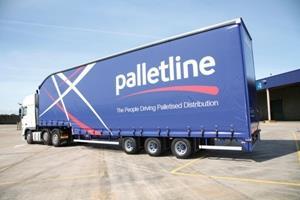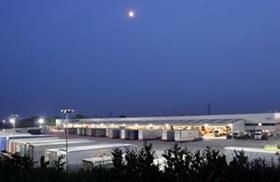
As the economy struggles, UK pallet networks continue to record year-on-year growth.
The UK’s pallet networks shifted more than 15.3 million pallets last year, a 7.3% rise on the number moved in 2010.
Data from the Association of Pallet Networks (APN) shows that while the UK, and beyond, has endured recession, the networks have continued to outperform the economy.

Eight of the nine UK networks are APN members, representing more than 650 hauliers, almost 30,000 vehicles and 13 million ft2 of warehouse space.
In the five years that APN has been benchmarking performance, its member networks have seen average pallet volume growth of 25%, compared to the economy’s attempt to avoid falling back into technical recession and a forecast of 0.6% GDP growth for 2012.
APN chairman Paul Sanders says: “Once again the sector has seen unprecedented volumes being handled by all member networks.”
But while the networks’ UK operations remain their engine rooms, the UK is an increasingly mature market with well-established players and the networks need to look further afield.
Key to future growth?
Despite Greece’s plight and the economic difficulties in Spain, Portugal and Italy, the Continent remains a largely untapped and potentially lucrative market for the networks.
Last autumn Hilary Devey’s Pall-Ex revealed plans to build a 15-country-strong European pallet network by 2015 (MT 10 October). The company plans to achieve this through the master franchise route, where a partner runs the service in each country in line with Pall-Ex’s stipulated service standards.
Pall-Ex MD Adrian Russell says: “Sending freight to Madrid is [in principle] the same as to Margate or Edinburgh.” He sees the extension of the Pall-Ex service, already established in Italy and Iberia, with France, Germany and Benelux on the cards, as a win-win situation for the network and its members.
It is a sentiment James Wilson, chief executive of Palletways, agrees with. Europe has been integral to the network since the ex-TNT man bought it in 2004 with backing from Phoenix Equity Partners.
“When we invested in the business we had three objectives: first to continue to invest in the UK to make it a market leader; second to copy Palletways’ model and open new networks on the Continent; and third to open a pan-European connection between the networks.”
Continental push
Wilson has done just that and the network now has directly, or majority-owned, operations in Benelux, Spain, Italy, Portugal, Switzerland and, most recently, Germany last July. France is the exception where Palletways partners local company CLL.
At the start of this year, Swedish Post was subcontracted to open up the Nordic region for Palletways.
Although European locations only contribute just over half the 26,000 pallets that Palletways Group handles each night, the growth potential in these markets is significant. While UK growth has cooled in recent months, in line with APC’s market data, growth in other countries is far higher.
Star performers
Wilson says Spain and Italy have been star performers in the company’s current financial year, which runs to the end of May.
“We are still in a high growth environment,” he says, but concedes that there is still work to be done to get Germany up to speed.
Building a directly-owned pallet network is not for the fainthearted. Wilson says the company has probably invested close to €20m (£16.6m) so far. “If you want to create a European company as opposed to a British company, you can’t do it with a million or two. You’ve got to be talking €10m, €20m, €30m to set it all up,” he says.
It’s a point not lost on Palletforce. Although active in Ireland and on the European mainland, international business represents just 3% of the network’s revenues.
Chief executive Michael Conroy told MT last year: “We see this as a big opportunity and would like a presence in the whole of Europe.”
Although direct ownership would be an option for Palletforce, which has no significant bank borrowing, Conroy, who is expected to make an announcement on Europe shortly, has indicated that he favours a partnership approach closer to what Palletways is doing. Palletforce also recently recruited John McKail as European development director.
A different stance
With all the clamour around Europe, Wolverhampton-based Pallet Track’s MD Nigel Parkes’ insistence that he will not even countenance European development for another two years seems all the more striking.
“The majority of operators on the Continent operate what we’d term freight networks,” says Parkes. “They haven’t got to the level of specialisation that the UK has.”
Pallet Track relies on members and tie-ups with Continental networks to meet European delivery needs, although Parkes continues to keep a watching brief. “I’m not getting carried away in the hysteria of Europe,” he says.
Wilson is unfazed. “First and foremost, the customers today in the UK broadly want a UK and European product offering. Secondly, the profit our members can generate out of an international shipment is probably six to seven times higher than a domestic shipment,” he says.
“In 2004, we had 70 locations in the UK and now we are 301-plus locations in Europe. We were doing 8,000 or 9,000 pallets a night, and now we’re doing more than 26,000 pallets a night.
“If you look at the next biggest pallet operator it might be doing 7,000 to 8,000. So our strategy is pro-UK and pro-Europe.”














